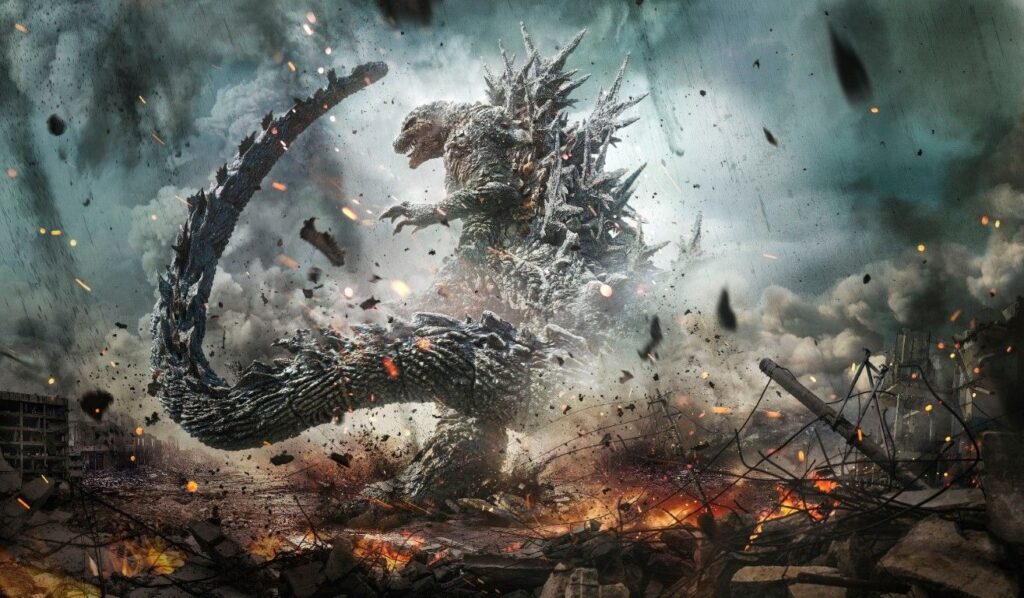Godzilla Minus One was released in Japan last month and in the U.S. this month, and it has already grossed over $40 million from a budget of $15 million. It has received praise from critics and audiences alike with a 97% on Rotten Tomatoes and an A on CinemaScore. In the film, Japan is already dealing with the destruction from the war, but it faces a new threat in the form of Godzilla, a powerful and menacing giant.
Nerd Reactor had the chance to chat with director Takashi Yamazaki, who also serves as the screenwriter and visual effects supervisor for Godzilla Minus One. His previous credits include Space Battleship Yamato, Lupin III: The First, and Returner. The director talks about his excitement about the North American release, how the original 1954 film inspired Godzilla Minus One, and more.
The interview was conducted during the week of the U.S. theatrical release. It has been edited for length and clarity.
Nerd Reactor: So Godzilla Minus One. It’s already out in Japan. It’s going to be out in U.S. theaters this week. How are you feeling right now with just the hype surrounding this and also just a great reception so far?
Takashi Yamazaki: Yeah, I’m very, very excited. I got a taste of it at the [L.A.] premiere. And I really can’t wait to see what the reactions are on a larger scale for North America. You know, this is my first time I’m like really officially releasing a film formally in North America. So I’m really excited about what the fan reaction will be.
Nerd Reactor: So what is it about Godzilla do you think attracts a worldwide audience?
Takashi Yamazaki: So I think one is that Godzilla always has an overwhelming power. And I think people just have this natural instinct to be drawn to undeniable power. So I think that’s one. But also Godzilla has been a metaphor in the past for war, a nuclear weapon, so that metaphor. Also just that Godzilla movies have never been just a Kaiju movie. There’s always something else going on. So I think those elements are what keep fans coming for more.
What attracted you to do a Godzilla film where it’s serious, deals with nuclear weapons and then Godzilla is just the bad guy?
Takashi Yamazaki: From when I started being a director, I’ve always wanted to do a Godzilla movie and I’ve always wanted to create a ferocious Godzilla, which then would lead me to ask, “Okay, what makes Godzilla so ferocious.” Also on top of that, the setting was an unkind setting to add to the story. And yeah, Godzilla is a great IP which people have come up with so many more variations, but I want to have a Godzilla close to the 1954 first Godzilla movie.
This Godzilla is very menacing and I’m scared when I see Godzilla on the screen. The atomic breath has more damage and there’s the explosion. So what was the idea behind that one?
Takashi Yamazaki: So I felt that these days people have been forgetting that one of Godzilla’s original metaphors was to represent nuclear weapons, and I wanted to make that very obvious. So that’s why you have the cloud and then followed by the black rain, so I wanted to be able to bring that metaphor back into focus again.
The human story deals with the aftermath of World War Two, and I think if you take out Godzilla, the story is still, for me at least, good. I would still enjoy this movie without Godzilla being in it. Was that a conscious effort for you in crafting a story like that?
Takashi Yamazaki: Yeah, it was a very conscious decision. And I felt that the existence of Godzilla is emphasized by the human story and by the audience connecting to the humans and experiencing the fear of Godzilla through the characters we’ve connected with. So that’s why the human story is so solid, but it’s also a little tip of the hat to the first Godzilla that also had a very solid human story element.
About Godzilla Minus One
Synopsis: Godzilla Minus One sees an already devastated postwar Japan facing a new threat in the form of Godzilla. This is the first domestic Japanese film since Shin Godzilla in 2016. GODZILLA MINUS ONE is written and directed by Takashi Yamazaki.
The film debuted in Japan on November 3, 2023, and in U.S. theaters on December 1, 2023.







